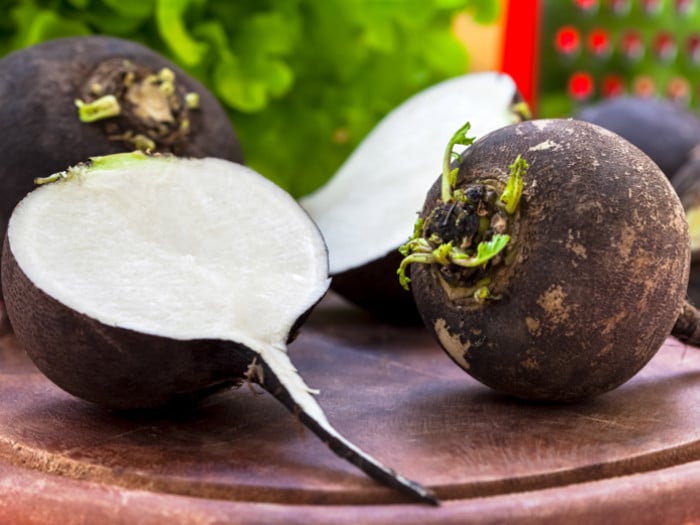Adding black radish to your dietary intake can help your overall health in a surprising number of ways.
What is Black Radish?
Black radish is a variety of radish that is native to Asia and Europe, scientifically known as Raphanus sativus L. var. niger, [1]and possesses a dark purple or black exterior. Commonly known as a Spanish radish, these vegetables are slightly larger than traditional radishes, and their flavor is stronger, making them more noticeable in recipes. The texture tends to be a bit tougher than normal radishes, and the interior is a stark white color. While this vegetable is not commonly found in every grocery store or market, its popularity has increased in recent decades, due to its impressive nutritional profile and associated health benefits.
Black Radish Nutrition
The many nutrients found in black radish include high amounts of dietary fiber and vitamin C, as well as moderate levels of iron, magnesium, potassium, and other key vitamins, such as vitamins B, A, and E. There are also lower levels of copper, selenium, zinc, specific anthocyanins, antioxidants, enzymes, and hormones. This vegetable is also very low in calories, with only 10 calories in a 3-ounce serving.

Black radish is a root vegetable with a strong bitter flavor. Photo Credit: Shutterstock
Black Radish Benefits
The many health benefits of black radish include its ability to improve liver function, manage hormone levels, control blood pressure, lower cholesterol, boost skin and hair health, improve digestion, treat constipation and bloating, prevent scurvy, improve mental alertness, reduce gallstones, and detoxify the body, among others. Let us discuss some of them in detail below.
Skin Health
With detoxifying properties and high levels of vitamin B and E, this vegetable is able to protect the health of your skin from inflammatory conditions, and also prevent oxidative stress, which can lead to wrinkles, age spots, and unwanted blemishes.
Liver Function
Glutathione is one of the most important antioxidants in the body and is responsible for ensuring that the liver doesn’t accumulate too many toxins. However, as you age and glutathione levels drop, foods like black radish, which can increase these levels, become more important to the maintenance of health. [2]
Immune System
Good amounts of vitamin C in this vegetable mean that your immune system will be boosted, as will your production of white blood cells, the first line of defense for the body against unwanted pathogens, bacteria, and toxins. [3]
Weight Loss
This vegetable is very low in calories but relatively high in dietary fiber, which can help you feel full, without contributing to your overall caloric intake. This, in turn, will lead to weight loss and an improved metabolic rate. [4]
Hyperthyroidism
If you suffer from hyperthyroidism or have been diagnosed, using this vegetable in your cooking can help to regulate hormonal levels and improve thyroid health. [5]
Cholesterol and Blood Pressure
Studies have found that this unusual vegetable can help to lower cholesterol levels and keep blood pressure within a healthy range, which reduces your risk of atherosclerosis, among others. [6]
Ways to Serve
There are a number of clever and delicious ways to include black radish in your diet, such as the following:
- Sautéing them with a bit of butter
- Slicing them finely to include in salads
- Baking them into black radish chips
Although the texture is quite tough, you can also blend these vegetables into soups and dips. These vegetables are safe when eaten raw or cooked.
Side Effects
There are some potential side effects of consuming too much black radish, as there are potential toxins, called glucosinolates in these vegetables. This radish is part of the cabbage family, all of which contain trace amounts of this compound. When consumed in large quantities, it can interfere with the production of thyroid hormone and may lead to the formation of a goiter. Some people are also allergic to this root vegetable, and should, therefore, avoid it.
